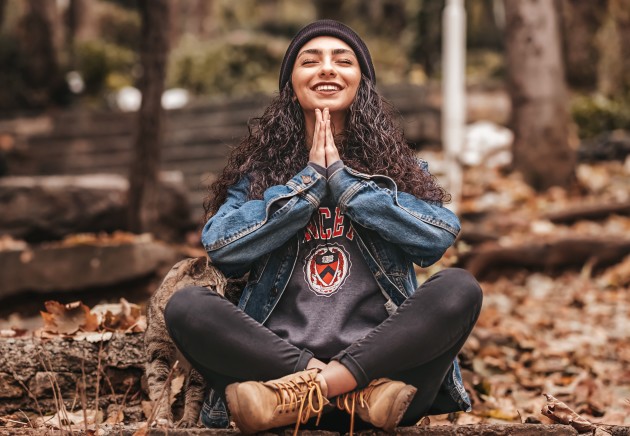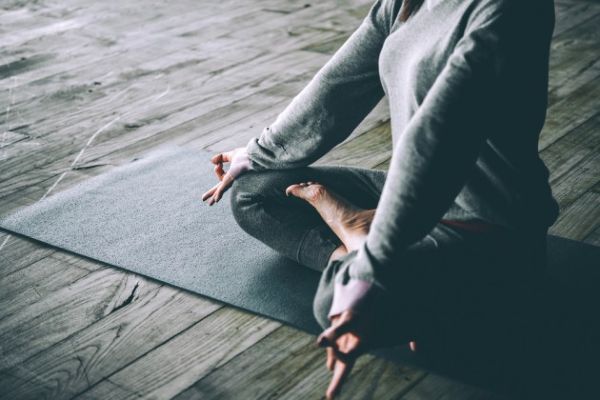
Why meditation will be your new best friend after lockdown
By Lauren Ablondi Olivo
For anyone with OCD or anxiety in general, intrusive thoughts are like our pesky neighbours; we’re well acquainted and familiar with them, no matter how much we wish they’d leave us alone. But for those who rarely felt anxious before the COVID-19 pandemic but are now feeling more stressed and worried than ever, intrusive thoughts will seem like a frightening and scary stranger, one that looms big and tall over us at all times. Did I wash my hands enough? What if I shouldn’t go to the park? How will I know if other people are being as cautious as I am? When will all of this go away?
The good news is, there are ways to cope. Those of us well versed in mental health often refer to these tips and tricks as our “toolkit”; readily available techniques and tools to whip out when we need them the most. And there’s one exercise that news outlets and mental health experts have been boasting about the most during quarantine: meditation.
If you’re anything like I was, you may have already rolled your eyes reading that word. I know, I know, meditation seems like something only hippies or monks do, but in reality, many therapists and mental health professionals recommend it. For those who aren’t familiar, meditation/mindfulness is, “at the most basic level, simply about thinking thoughts, then letting go of them,” according to Suze Yalof Schwartz, founder of Unplug Meditation.
I, like many, was a total sceptic in the beginning: my therapist had been begging me for years to try mediation, but every time I did, I couldn’t seem to get it right. I’d sit there, willing myself not to think, and get frustrated with myself as soon as I would. Thoughts about dinner, the rest of my day, and even the far-away future constantly popped in and made themselves known. I thought I was doing it wrong or that I wasn’t any good at it; that someone like me, with an anxious, noisy brain would never be able to get it to shut up. It was like that scene from Parks and Recreation where Ron tries to meditate with Chris; the more I wanted to be perfect at it, like Chris, the less it worked. I needed to try and adopt Ron’s method; the not caring, don’t give a f*ck attitude.

It wasn’t until I had a particularly bad bout of anxiety and intrusive thoughts from my OCD that I realized I needed to fully commit to giving this whole meditation thing a try. I read up on it, bought workbooks, and downloaded apps. The one that has been the most beneficial for me is the app called Headspace. Headspace emphasizes the fact that meditation is a skill and a practice; you won’t get it right on the first, or second, or third, try. But the whole point is to practice; to re-train your mind to have a more distant approach to your thoughts instead of letting yourself get wrapped up in them. The most helpful part of the practice has been the concept of “noting” what you’re experiencing while meditation; if a thought or a feeling pops in, you simply identify it and let it go. So, for example, if I’m sitting in my chair, trying to meditate, and my brain says something like, “Ugh, you shouldn’t have gotten so close to that person yesterday. You’re probably sick and infected them,” I simply say to myself, “Okay, I’m thinking,” and don’t engage any further. Or, if I suddenly feel my heartbeat picking up or a pit in my stomach, I say, “Okay, I’m feeling,” and go back to focusing on my breath.

It’s incredibly frustrating, don’t get me wrong; for someone who has spent their entire life grappling with these intrusive thoughts and worries, trying to “let them go” seems like an impossible task. But, practice makes (almost) perfect. Having now meditated for fifteen minutes for thirty days in a row, I’ve already noticed that I’m getting better at staying present; at focusing on my breath or my task at hand. Those pesky thoughts still come, but I’m able to view them from a more logical, grounded lens.
The results of meditation speak for themselves: according to healthline.com, meditation has proven to “reduce stress, control anxiety, enhance self awareness, generate kindness, and improve sleep.”
The next time you’re starting to feel anxious: just try it! Even if it’s for five minutes, or even one minute, try sitting and focusing on your breath, and see how you get on. Like me, you might be adding this to your toolkit permanently.






